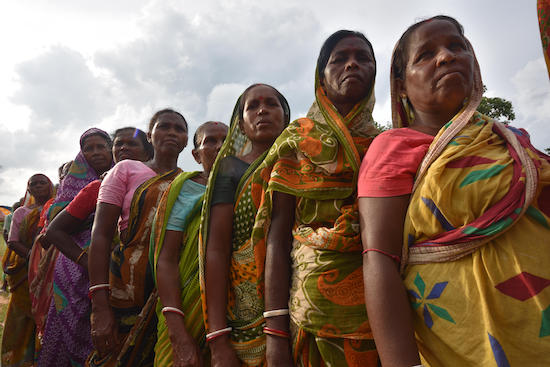According to multiple transnational research papers published across the world, the progress of a country, in terms of social development and economic growth, is heavily dependent on the participation of its female labour force.

Women have been left behind in terms of being a part of the Indian workforce
As India stands poised at the precipice of a digital revolution aimed at propelling the economy past the five trillion mark by 2025, it is imperative that the women of the country, especially women in rural India, who, according to data compiled by world bank in 2020, contribute to more than 48% of the population of the country, play a substantial part in order for this objective to be fulfilled.
Over several decades, despite the economic growth, urbanisation, and an overall decline in fertility rates, women have been left behind in terms of being a part of the Indian workforce. The Periodic Labour Force Survey (PLFS) 2019-20 shows female labour force participation at a dismal 22.8%, compared to a far higher 56.8% for men. Conducted before the pandemic, this survey still shows higher numbers than what the ground reality is as of today since the pandemic has further shrunk the country’s female workforce. March 2021 data shows the numbers at 16.9%, a huge drop since the pandemic ensued.
The best possible solution to bridging this gender gap is skilling. Skilling, in fact, happens to be aligned with the United Nations Sustainable Development Goals (SDGs) related to decent work and gender equality. The central government, too, is tuned towards this and in 2015, launched the National Skill Development Mission (NSDM), which, in its policy document, iterates how women constitute half of our demographic dividend.
According to the Ministry of Statistics and Programme Implementation, women constitute 14% of the total entrepreneurs in India; however, in rural India, 66% of women still remain excluded. Apart from social inhibitors, some of the major reasons behind this are low awareness, lack of digital literacy and absence of financial knowledge. It is, therefore, important to encourage women to take up income-generating activities and at the same time equip them with the necessary skills, information, and resources to carry out these activities.
Rural fintech companies that have been complementing the traditional banking system and have been providing essential financial services to the last mile of the country have also been involved in skilling initiatives for rural women. Along with men, these fintech companies have been encouraging rural women too, to step into the realms of financial self-reliance and freedom. To equip more women to become financially self-reliant and grow as nanopreneurs, these rural fintechs have started zero investment onboarding where a female nanopreneur can sign up virtually free of cost.
The gap between rural women and their urban counterparts in terms of financial knowledge and literacy is huge. Financial knowledge pertains to the ability to deal with everyday financial matters and make the right choice in spending, borrowing, budgeting, savings and investment decisions. Financial literacy is the ability to make an informed choice and to take effective action regarding money and how to manage it, so that person can make better financial decisions. To ensure that these are in order, rural fintechs conduct skilling programmes for women and impart financial knowledge, to equip them with information on ways to save, ways to invest, and the different kinds of products that they can use as nanopreneurs.
They also train rural women with essential digital tools like Unified Payments Interface (UPI, India’s real-time payments system), Aadhaar Pay (customers can pay merchants using their Aadhaar number and biometric authentication), cash deposits and withdrawals, so that they can utilise them while running their own businesses, in the process helping their communities as well.
The effect of these skilling initiatives is manifold. With the help of these skilling initiatives, rural women are running their own businesses, earning their way to financial self-reliance, while, in the process, breaking socio-cultural barriers and stereotypes, and becoming bankers in their communities. People look up to them for essential financial services that were either unavailable or difficult to avail.
Rural fintech brands that have been at the forefront of providing banking and financial services to the unbanked and the underbanked in the hinterlands of India, together with these skilling initiatives for women, are also helping the growth of women nanopreneurs, thereby fostering inclusivity, and helping further bridge the rural-urban divide.
 About the author
About the author
Sanjeev Kumar is an accomplished industry leader with close to 20 years of extensive experience across banking, payments and insurance sectors. As the co-founder and CEO of Spice Money, he brings a deep focus towards achieving the company’s mission of digitally and financially empowering ten million rural entrepreneurs through the Spice Money Adhikari (Merchant Entrepreneur) Network.
Kumar was born in a small village in rural India. He has seen and experienced the struggles of the rural population first hand, whether it is the lack of power or travel infrastructure or the absence of financial services. His life experiences have worked as a foundation to shape his vision towards uplifting and transforming the lives in rural India.
Prior to joining Spice Money, he was associated with Jio Payments Bank, where he led sales and distribution. He has also worked with companies such as Yes Bank, where he spent over 12 years, Max New York Life Insurance, Bajaj Allianz and Infosys Technologies.
Kumar holds a BTech degree from the Indian Institute of Technology, Varanasi.
Credit: Source link


Comments are closed.